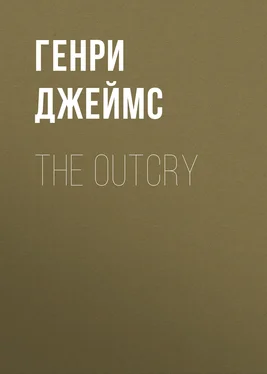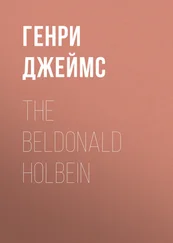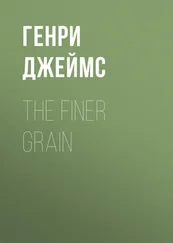Генри Джеймс - The Outcry
Здесь есть возможность читать онлайн «Генри Джеймс - The Outcry» — ознакомительный отрывок электронной книги совершенно бесплатно, а после прочтения отрывка купить полную версию. В некоторых случаях можно слушать аудио, скачать через торрент в формате fb2 и присутствует краткое содержание. Жанр: foreign_antique, foreign_home, visual_arts, на английском языке. Описание произведения, (предисловие) а так же отзывы посетителей доступны на портале библиотеки ЛибКат.
- Название:The Outcry
- Автор:
- Жанр:
- Год:неизвестен
- ISBN:нет данных
- Рейтинг книги:5 / 5. Голосов: 1
-
Избранное:Добавить в избранное
- Отзывы:
-
Ваша оценка:
- 100
- 1
- 2
- 3
- 4
- 5
The Outcry: краткое содержание, описание и аннотация
Предлагаем к чтению аннотацию, описание, краткое содержание или предисловие (зависит от того, что написал сам автор книги «The Outcry»). Если вы не нашли необходимую информацию о книге — напишите в комментариях, мы постараемся отыскать её.
The Outcry — читать онлайн ознакомительный отрывок
Ниже представлен текст книги, разбитый по страницам. Система сохранения места последней прочитанной страницы, позволяет с удобством читать онлайн бесплатно книгу «The Outcry», без необходимости каждый раз заново искать на чём Вы остановились. Поставьте закладку, и сможете в любой момент перейти на страницу, на которой закончили чтение.
Интервал:
Закладка:
The subject of his suit took the longest look at him she had taken yet. “You’re very good to say so!”
If this was ironic the touch fell short, thanks to his perception that they had practically just ceased to be alone. They were in presence of a third figure, who had arrived from the terrace, but whose approach to them was not so immediate as to deprive Lord John of time for another question. “Will you let him tell you, at all events, how good he thinks me?—and then let me come back and have it from you again?”
Lady Grace’s answer to this was to turn, as he drew nearer, to the person by whom they were now joined. “Lord John desires you should tell me, father, how good you think him.”
“‘Good,’ my dear?—good for what?” said Lord Theign a trifle absurdly, but looking from one of them to the other.
“I feel I must ask him to tell you.”
“Then I shall give him a chance—as I should particularly like you to go back and deal with those overwhelming children.”
“Ah, they don’t overwhelm you , father!”—the girl put it with some point.
“If you mean to say I overwhelmed them , I dare say I did,” he replied—“from my view of that vast collective gape of six hundred painfully plain and perfectly expressionless faces. But that was only for the time: I pumped advice—oh such advice!—and they held the large bucket as still as my pet pointer, when I scratch him, holds his back. The bucket, under the stream—”
“Was bound to overflow?” Lady Grace suggested.
“Well, the strong recoil of the wave of intelligence has been not unnaturally followed by the formidable break. You must really,” Lord Theign insisted, “go and deal with it.”
His daughter’s smile, for all this, was perceptibly cold. “You work people up, father, and then leave others to let them down.”
“The two things,” he promptly replied, “require different natures.” To which he simply added, as with the habit of authority, though not of harshness, “Go!”
It was absolute and she yielded; only pausing an instant to look as with a certain gathered meaning from one of the men to the other. Faintly and resignedly sighing she passed away to the terrace and disappeared.
“The nature that can let you down—I rather like it, you know!” Lord John threw off. Which, for an airy elegance in them, were perhaps just slightly rash words—his companion gave him so sharp a look as the two were left together.
VI
Face to face with his visitor the master of Dedborough betrayed the impression his daughter appeared to have given him. “She didn’t want to go?” And then before Lord John could reply: “What the deuce is the matter with her?”
Lord John took his time. “I think perhaps a little Mr. Crimble.”
“And who the deuce is a little Mr. Crimble?”
“A young man who was just with her—and whom she appears to have invited.”
“Where is he then?” Lord Theign demanded.
“Off there among the pictures—which he seems partly to have come for.”
“Oh!”—it made his lordship easier. “Then he’s all right—on such a day.”
His companion could none the less just wonder. “Hadn’t Lady Grace told you?”
“That he was coming? Not that I remember.” But Lord Theign, perceptibly preoccupied, made nothing of this. “We’ve had other fish to fry, and you know the freedom I allow her.”
His friend had a vivid gesture. “My dear man, I only ask to profit by it!” With which there might well have been in Lord John’s face a light of comment on the pretension in such a quarter to allow freedom.
Yet it was a pretension that Lord Theign sustained—as to show himself far from all bourgeois narrowness. “She has her friends by the score—at this time of day.” There was clearly a claim here also—to know the time of day. “But in the matter of friends where, by the way, is your own—of whom I’ve but just heard?”
“Oh, off there among the pictures too; so they’ll have met and taken care of each other.” Accounting for this inquirer would be clearly the least of Lord John’s difficulties. “I mustn’t appear to Bender to have failed him; but I must at once let you know, before I join him, that, seizing my opportunity, I have just very definitely, in fact very pressingly, spoken to Lady Grace. It hasn’t been perhaps,” he continued, “quite the pick of a chance; but that seemed never to come, and if I’m not too fondly mistaken, at any rate, she listened to me without abhorrence. Only I’ve led her to expect—for our case—that you’ll be so good, without loss of time, as to say the clinching word to her yourself.”
“Without loss, you mean, of—a—my daughter’s time?” Lord Theign, confessedly and amiably interested, had accepted these intimations—yet with the very blandness that was not accessible to hustling and was never forgetful of its standing privilege of criticism. He had come in from his public duty, a few minutes before, somewhat flushed and blown; but that had presently dropped—to the effect, we should have guessed, of his appearing to Lord John at least as cool as the occasion required. His appearance, we ourselves certainly should have felt, was in all respects charming—with the great note of it the beautiful restless, almost suspicious, challenge to you, on the part of deep and mixed things in him, his pride and his shyness, his conscience, his taste and his temper, to deny that he was admirably simple. Obviously, at this rate, he had a passion for simplicity—simplicity, above all, of relation with you, and would show you, with the last subtlety of displeasure, his impatience of your attempting anything more with himself. With such an ideal of decent ease he would, confound you, “sink” a hundred other attributes—or the recognition at least and the formulation of them—that you might abjectly have taken for granted in him: just to show you that in a beastly vulgar age you had, and small wonder, a beastly vulgar imagination. He sank thus, surely, in defiance of insistent vulgarity, half his consciousness of his advantages, flattering himself that mere facility and amiability, a true effective, a positively ideal suppression of reference in any one to anything that might complicate, alone floated above. This would be quite his religion, you might infer—to cause his hands to ignore in whatever contact any opportunity, however convenient, for an unfair pull. Which habit it was that must have produced in him a sort of ripe and radiant fairness; if it be allowed us, that is, to figure in so shining an air a nobleman of fifty-three, of an undecided rather than a certified frame or outline, of a head thinly though neatly covered and not measureably massive, of an almost trivial freshness, of a face marked but by a fine inwrought line or two and lighted by a merely charming expression. You might somehow have traced back the whole character so presented to an ideal privately invoked—that of his establishing in the formal garden of his suffered greatness such easy seats and short perspectives, such winding paths and natural-looking waters, as would mercifully break up the scale. You would perhaps indeed have reflected at the same time that the thought of so much mercy was almost more than anything else the thought of a great option and a great margin—in fine of fifty alternatives. Which remarks of ours, however, leave his lordship with his last immediate question on his hands.
Конец ознакомительного фрагмента.
Текст предоставлен ООО «ЛитРес».
Прочитайте эту книгу целиком, купив полную легальную версию на ЛитРес.
Читать дальшеИнтервал:
Закладка:
Похожие книги на «The Outcry»
Представляем Вашему вниманию похожие книги на «The Outcry» списком для выбора. Мы отобрали схожую по названию и смыслу литературу в надежде предоставить читателям больше вариантов отыскать новые, интересные, ещё непрочитанные произведения.
Обсуждение, отзывы о книге «The Outcry» и просто собственные мнения читателей. Оставьте ваши комментарии, напишите, что Вы думаете о произведении, его смысле или главных героях. Укажите что конкретно понравилось, а что нет, и почему Вы так считаете.












